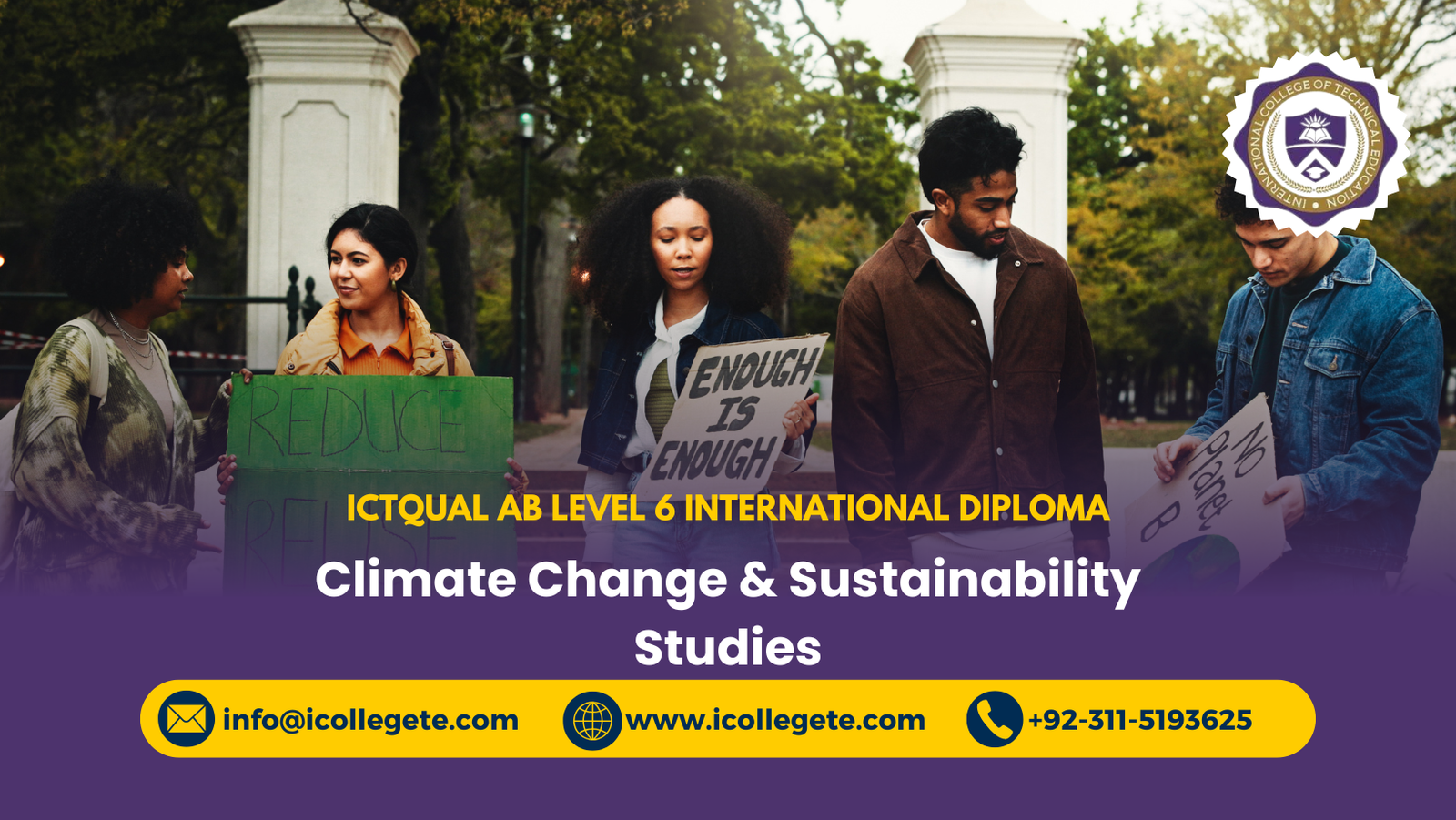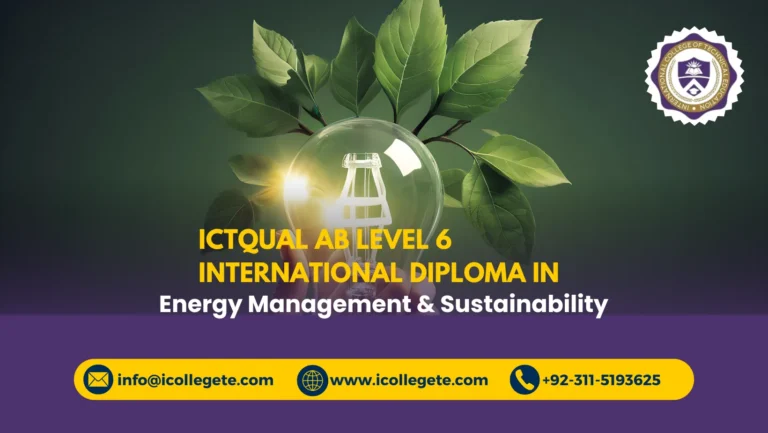The ICTQual AB Level 6 International Diploma in Climate Change & Sustainability Studies is a prestigious three‑year, 360‑credit qualification designed to equip learners with advanced knowledge and practical skills to address one of the most urgent challenges of our time—climate change. ICTQual AB Level 6 International Diploma in Climate Change & Sustainability Studies provides a comprehensive understanding of climate science, sustainability strategies, and environmental governance, preparing graduates to lead global efforts in building a more sustainable future.
Learners will explore a wide range of critical topics including climate change science, carbon management, renewable energy systems, sustainable development practices, and international policy frameworks. The curriculum emphasizes both theoretical foundations and real‑world applications, ensuring that students develop the ability to design, implement, and evaluate sustainability initiatives across diverse sectors such as government, NGOs, corporate enterprises, and international organizations.
ICTQual AB Level 6 International Diploma in Climate Change & Sustainability Studies is ideal for students, professionals, and community leaders who aspire to make a meaningful impact in environmental management, climate policy, and sustainable development. ICTQual AB Level 6 International Diploma in Climate Change & Sustainability Studies also provides a clear academic progression pathway to Level 7 Postgraduate Diplomas and Master’s programs in Sustainability Studies, Environmental Science, or International Development.
Year 1 – Foundations of Climate Change & Sustainability
- Introduction to Climate Change Science
- Principles of Sustainability and Environmental Management
- Global Environmental Policies and Governance
- Carbon Footprint and Greenhouse Gas Accounting
- Renewable Energy Fundamentals
- Climate Change Impacts and Adaptation Strategies
- Environmental Ethics and Professional Responsibility
- Sustainable Resource Management
- Environmental Monitoring and Data Analysis
- Introduction to Project Planning in Climate Initiatives
- Environmental Communication and Stakeholder Engagement
- Introduction to Risk Assessment in Environmental Management
Year 2 – Applied Climate Change & Sustainability Practices
- Advanced Climate Change Mitigation Strategies
- Sustainable Urban and Industrial Development
- Environmental Impact Assessment (EIA)
- Carbon Management and Trading
- Energy Efficiency and Renewable Integration
- Climate Policy Implementation and Compliance
- Waste Management and Circular Economy Principles
- Environmental Auditing and Reporting Techniques
- Digital Tools and Technologies for Sustainability
- Organisational Behaviour and Sustainability Leadership
- Research Methods in Climate and Sustainability Projects
- Applied Project Planning and Operational Management
Year 3 – Strategic Leadership in Climate Change & Sustainability
- Strategic Sustainability Leadership
- International Climate Agreements and Standards
- Environmental Risk and Crisis Management
- Corporate Social Responsibility (CSR) and Sustainability Strategy
- Sustainable Supply Chain and Resource Management
- Innovation and Emerging Technologies in Sustainability
- Climate Change Policy Development and Implementation
- Environmental Governance and Ethics in Leadership
- Advanced Project Management for Sustainability Initiatives
- Renewable Energy Systems and Integration Strategies
- Independent Research Project in Climate Change & Sustainability
- Capstone Project: Applied Climate Change & Sustainability Studies
Year 1 – Foundations of Climate Change & Sustainability
1. Introduction to Climate Change Science
- Explain the science behind climate change, including greenhouse gases and global warming.
- Analyse the impact of human activities on climate systems.
2. Principles of Sustainability and Environmental Management
- Apply sustainability principles to organisational and societal contexts.
- Evaluate strategies for sustainable resource use and environmental protection.
3. Global Environmental Policies and Governance
- Interpret international environmental policies and agreements.
- Assess organisational compliance with global environmental regulations.
4. Carbon Footprint and Greenhouse Gas Accounting
- Measure and analyse carbon emissions in various sectors.
- Develop strategies to reduce organisational carbon footprints.
5. Renewable Energy Fundamentals
- Describe key renewable energy sources and technologies.
- Evaluate the environmental and economic impacts of renewable energy adoption.
6. Climate Change Impacts and Adaptation Strategies
- Identify potential environmental, social, and economic impacts of climate change.
- Formulate adaptation strategies to mitigate risks.
7. Environmental Ethics and Professional Responsibility
- Apply ethical principles in climate change and sustainability decision-making.
- Demonstrate accountability and responsibility in environmental projects.
8. Sustainable Resource Management
- Manage natural resources efficiently and sustainably.
- Analyse the environmental consequences of resource use.
9. Environmental Monitoring and Data Analysis
- Monitor environmental indicators using quantitative and qualitative methods.
- Interpret data to inform sustainability decision-making.
10. Introduction to Project Planning in Climate Initiatives
- Develop project plans for climate and sustainability initiatives.
- Identify resources, timelines, and risk considerations for projects.
11. Environmental Communication and Stakeholder Engagement
- Communicate sustainability objectives effectively to stakeholders.
- Develop engagement strategies to promote environmental awareness.
12. Introduction to Risk Assessment in Environmental Management
- Conduct basic environmental risk assessments.
- Propose mitigation measures for identified risks.
Year 2 – Applied Climate Change & Sustainability Practices
1. Advanced Climate Change Mitigation Strategies
- Design and implement mitigation strategies for carbon reduction.
- Evaluate effectiveness and feasibility of climate interventions.
2. Sustainable Urban and Industrial Development
- Apply sustainable development principles in urban and industrial contexts.
- Assess environmental impacts of construction and industrial projects.
3. Environmental Impact Assessment (EIA)
- Conduct comprehensive environmental impact assessments.
- Recommend measures to minimise negative environmental effects.
4. Carbon Management and Trading
- Develop carbon management plans and emission reduction strategies.
- Analyse carbon trading mechanisms and sustainability incentives.
5. Energy Efficiency and Renewable Integration
- Implement energy efficiency measures in industrial and commercial operations.
- Integrate renewable energy technologies into organisational strategies.
6. Climate Policy Implementation and Compliance
- Apply national and international climate policies to organisational settings.
- Monitor compliance and report environmental performance.
7. Waste Management and Circular Economy Principles
- Develop strategies for sustainable waste management and recycling.
- Apply circular economy principles to reduce resource consumption.
8. Environmental Auditing and Reporting Techniques
- Conduct environmental audits to assess sustainability performance.
- Prepare reports in line with international standards and regulations.
9. Digital Tools and Technologies for Sustainability
- Utilise digital tools for monitoring, analysis, and reporting.
- Assess technology effectiveness in supporting sustainability goals.
10. Organisational Behaviour and Sustainability Leadership
- Promote a culture of sustainability within organisations.
- Apply leadership skills to drive environmental initiatives.
11. Research Methods in Climate and Sustainability Projects
- Apply research methodologies to sustainability and climate projects.
- Analyse and interpret data to support decision-making.
12. Applied Project Planning and Operational Management
- Plan and execute operational projects in climate change and sustainability.
- Manage resources, timelines, and stakeholders effectively.
Year 3 – Strategic Leadership in Climate Change & Sustainability
1. Strategic Sustainability Leadership
- Lead organisational sustainability strategies at a strategic level.
- Align projects with global sustainability objectives.
2. International Climate Agreements and Standards
- Evaluate international climate agreements and their impact on organisations.
- Ensure organisational compliance with global sustainability standards.
3. Environmental Risk and Crisis Management
- Identify and manage risks in complex environmental projects.
- Develop contingency plans for environmental crises.
4. Corporate Social Responsibility (CSR) and Sustainability Strategy
- Integrate CSR strategies into sustainability planning.
- Measure and report organisational social and environmental impact.
5. Sustainable Supply Chain and Resource Management
- Implement sustainable practices across supply chains.
- Analyse resource flows and optimise for environmental efficiency.
6. Innovation and Emerging Technologies in Sustainability
- Evaluate new technologies for energy, resource efficiency, and emissions reduction.
- Apply innovative solutions to complex sustainability challenges.
7. Climate Change Policy Development and Implementation
- Develop organisational climate policies and procedures.
- Implement and monitor policy effectiveness in operational settings.
8. Environmental Governance and Ethics in Leadership
- Promote ethical practices and governance frameworks in environmental management.
- Ensure decision-making aligns with international environmental standards.
9. Advanced Project Management for Sustainability Initiatives
- Plan, manage, and evaluate complex sustainability projects.
- Ensure projects meet technical, environmental, and regulatory objectives.
10. Renewable Energy Systems and Integration Strategies
- Design and implement renewable energy solutions for organisations.
- Assess environmental, technical, and financial feasibility.
11. Independent Research Project in Climate Change & Sustainability
- Conduct independent research on a relevant sustainability topic.
- Analyse findings and present evidence-based recommendations.
12. Capstone Project: Applied Climate Change & Sustainability Studies
- Integrate knowledge and skills from all units into a comprehensive project.
- Demonstrate applied problem-solving, strategic planning, and sustainability leadership.
Academic Excellence and Recognition
- Earn a globally recognized Level 6 qualification in Climate Change & Sustainability Studies
- Gain advanced knowledge of climate science, sustainability strategies, and environmental governance
- Study a curriculum aligned with international academic and industry standards
- Build a strong academic foundation for postgraduate diplomas and master’s programs
- Enhance your academic profile for teaching, research, and higher education opportunities
Career Advancement Opportunities
- Open pathways to careers in environmental management, climate policy, and sustainability consulting
- Qualify for roles such as sustainability officer, climate change analyst, or environmental consultant
- Strengthen employability in government, NGOs, and corporate sustainability departments
- Gain practical skills that employers value, including carbon management and renewable energy planning
- Position yourself for leadership roles in climate action and sustainable development sectors
Practical and Technical Skills Development
- Learn to conduct climate risk assessments and sustainability audits
- Master tools for carbon footprint analysis and greenhouse gas reduction strategies
- Apply renewable energy and circular economy solutions to real‑world challenges
- Gain hands‑on expertise in sustainability project design and implementation
- Develop operational plans for climate adaptation and mitigation initiatives
Global and Ethical Perspective
- Understand international climate agreements, policies, and compliance standards
- Explore the role of sustainability in achieving the UN Sustainable Development Goals (SDGs)
- Promote ethical and sustainable practices in business, governance, and community development
- Build awareness of climate justice and equity in global sustainability efforts
- Prepare to contribute to international climate action and policy reforms
Personal and Professional Growth
- Strengthen leadership, project management, and decision‑making skills
- Improve communication and advocacy abilities for sustainability initiatives
- Gain confidence to work in diverse, multicultural, and global environments
- Develop entrepreneurial skills for launching green and sustainability ventures
- Build a career that combines academic achievement with meaningful environmental impact
- Students and Fresh Graduates
- Learners who want to build a career in climate change, sustainability, and environmental management
- Students seeking an internationally recognized qualification to strengthen their academic profile
- Graduates aiming to progress toward postgraduate diplomas or master’s degrees in sustainability, environmental science, or international development
- Individuals passionate about climate action, renewable energy, and sustainable development
- Environmental and Corporate Professionals
- Professionals working in environmental services, renewable energy, or corporate sustainability departments
- Employees in compliance, risk management, or environmental health and safety roles
- Consultants and managers aiming to expand expertise in climate policy and sustainability strategies
- Engineers and technical staff seeking to specialize in green technologies and carbon management
- Government and Public Sector Employees
- Civil servants and policymakers working in ministries of environment, energy, or planning
- Municipal officers responsible for climate adaptation, waste reduction, or sustainability programs
- Regulators and administrators involved in environmental governance and compliance
- Public sector employees preparing for senior roles in climate policy and sustainable development
- NGO and Community Leaders
- NGO professionals engaged in climate action, sustainability, and community development projects
- Leaders working on grassroots initiatives for renewable energy, recycling, or sustainable agriculture
- Advocates promoting environmental justice, equity, and the UN Sustainable Development Goals (SDGs)
- Community organizers aiming to implement effective climate adaptation and mitigation strategies
- Academics and Researchers
- Educators and trainers in environmental science, sustainability, and international development
- Researchers focusing on climate change, renewable energy, and circular economy models
- Scholars preparing for doctoral research in sustainability, climate policy, or environmental governance
- Academic professionals seeking to integrate global sustainability practices into teaching and research










